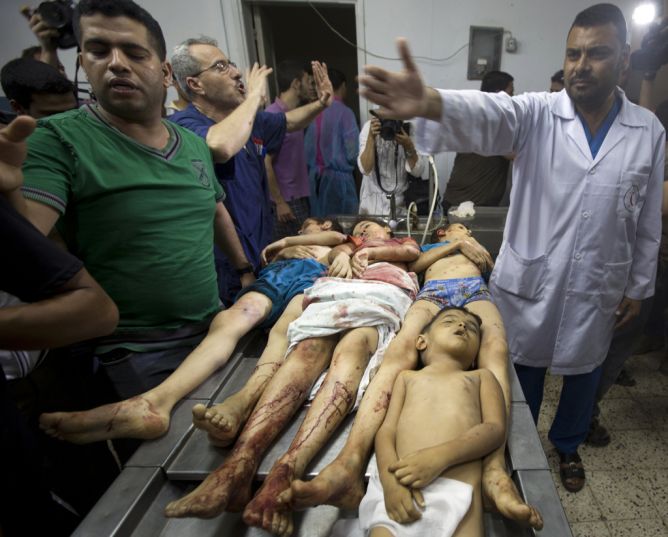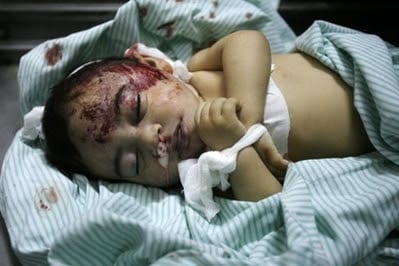Embodiment of Absolute Evil
RON JACOBS
Occupation Explained

Gaza victims of Israeli aerial attacks in 2014. Expect these horrors to continue indefinitely. On average about 70% of all Palestinian casualties are civilian, and many are children and women. (RT.com)
[dropcap]A[/dropcap]s I write this, Israel is holding an election and it appears the far-right under Netanyahu has won again. This result indicates that it will be Likud and its allies which will maintain the daily harassment and brutalization of Palestinians known as the Occupation. Even if a less rightist candidate had won there would not have been an end to the policy. Like a bulldozer, history pushes onward, shattering everything in its path.
In 1949, S. Yizhar, (Yizhar Smilansky) wrote a short novel titled Khirbet Khizeh. It is a story of the expulsion of Palestinians from their village (Khirbet Khizeh) by the Israeli military. Told through the eyes of a young soldier whose unit is doing the removal, Yizhar describes the tactics used. Although fiction, the tactics described are essentially no different than those in use today by that soldier’s successors: notifying the villagers they have a couple hours to pack their belongings, forcing them all to the town center, separating the young men from the old, the women and the children, and stealing or killing their livestock. As Yizhar’s protagonist carries out his orders, he records the reactions of his fellow soldiers. Like almost any fictional group of soldiers, these reactions range from an expressed disgust with the subjects of their maneuvers to an abject hatred. Then there are the doubts as to their morality—doubts quickly suppressed for fear of ridicule from their fellows or a sense of duty. Some of the soldiers justify their deeds by refusing to acknowledge the Palestinians humanity. Others recall a slight they received in another village and use that to justify their actions. Yizhar’s protagonist understands these attempts to rationalize the forced removals, but can no longer make them work for himself. Instead, he goes along with the squad, all the time questioning what he is participating in.
Over fifty years later, another Israeli soldier named Noam Chayut wrote these words to describe an encounter he had with a young Palestinian girl under occupation:
“For that girl, I embodied absolute evil. Even if I was not as cruel as the absolute—Nazi—evil in the shadow of which I had grown up, I didn’t have to achieve its perfection and force in order to fulfill my role in her life.”
Chayut’s book, The Girl Who Stole my Holocaust, is a memoir. It shares a philosophical and emotional motif with Khirbet Khizeh and just as evocatively expresses a moral concern with the nature of the expansion of Israel and its occupation of Palestinian lands. Chayut narrates a life probably quite typical for an Israeli born in 1979. He tells about patriotic indoctrination and membership in a patriotic youth group; trips to Auschwitz and lectures about the horrific evil that was the Holocaust. He describes his missions into Jenin and other towns in the Territories and the havoc his troops visited on the people living there. Like the fictionalized novella Khirbet Khizeh, The Girl Who Stole My Holocaust relates a horror perpetrated on a people in the name of righteousness; oppression of one people in the pursuit of another people’s justice.
Similarly, it is also the story of an individual soldier, a child of the realm so to speak, experiencing a moral awakening. It is when Chayut is approached by the Israeli veteran’s group Breaking the Silence that his awakening truly occurs. These Israelis, like their fellows in the US who gather under the banner of Veterans for Peace, Iraq Veterans Against the War, and Vietnam Veterans Against the War, bear witness to their deeds—their crimes—they undertook in the name of their country. Also like their fellows in the US, the truths these veterans tell are not well received by many of their countrymen and women. In as much as the moral witness these veterans bring to their nations, their actions also serve as a moral reckoning for themselves. Never once in either of these books does the protagonist refuse an order, even after they have begun to doubt the morality of their mission. Like so many others who have worn (or are wearing) a uniform, it is this fact that often wreaks the most damage.

Palestinian child victim of bombing. These images fail to move the Israeli public, and the world largely ignores them—that is, when the mainstream media dares to show them. (Credit: PCHR)
Both of these books are stories of occupation and the dehumanization of the occupied. Even though they take place a half-century apart, they are also descriptions of the victim becoming the executioner, in the persona of the Jews that emigrated to Israel and their offspring. These narratives are important, even with all of their moral uncertainty. So, too, are the efforts of those Israelis who go one step further and change sides to bear witness for the situation their nation has placed the Palestinians in. Unfortunately, even despite these efforts, there has been no reversal of the march towards a greater Israel desired by many Israelis and their supporters. Moral witness assumes a shared sense of morality, something apparently not present at this point in time. These soldiers and others with a similar moral revulsion at the actions they have been a part of know that it is their nation that has given them the permission, the encouragement to commit the crimes against other humans. It is they who have accepted the rules of engagement which bureaucratize those crimes. In other words, it is like those people at protests who call “Shame!” when a cop beats someone, even though the cops generally have no shame when it comes to beating people.
Yizhar’s novel was once part of the Israeli high school curriculum. Nowadays, however, almost any questioning of the morality of Israel’s quest for an ever greater Israel is considered criminal. The ongoing reign of the far-right in that country ensures this denial will continue. Furthermore, although these stories are about Israel, they are not just about Israel. They are about every occupied people and every occupying nation.
[box] Ron Jacobs is the author of a series of crime novels called The Seventies Series. All the Sinners, Saints, is the third novel in the series. He is also the author of The Way the Wind Blew: a History of the Weather Underground . Jacobs’ essay on Big Bill Broonzy is featured in CounterPunch’s collection on music, art and sex, Serpents in the Garden. He is a contributor to Hopeless: Barack Obama and the Politics of Illusion, published by AK Press. His book Daydream Sunset: Sixties Counterculture in the Seventies will be published by Counterpunch. He can be reached at: ronj1955@gmail.com. [/box]
SOURCE: COUNTERPUNCH
[printfriendly]
What is $1 a month to support one of the greatest publications on the Left?

